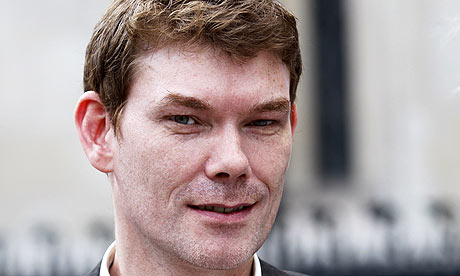
The extradition of Gary McKinnon, accused of hacking into US military computers has been put on hold. Photograph: Sang Tan/AP
The extradition of the computer hacker Gary McKinnon has been put on hold after the home secretary, Theresa May, agreed to an adjournment of a judicial review that was supposed to start within days.
The move will allow May to begin formal consideration of the medical evidence to see whether McKinnon is fit to be extradited. If it is established that he cannot be allowed to go, it paves the way for a prosecution in the UK.
A Home Office spokesperson said: "The home secretary has considered the proposal from Gary McKinnon's legal team and has agreed an adjournment should be sought. An application to the court is being made today."
McKinnon's lawyer, Karen Todner, said she hoped May would make a decision on whether he was fit to be extradited in a matter of weeks.
Todner said: "The secretary of state, having recently taken office and having received further representations from the claimant's representatives, wishes to have appropriate time fully to consider the issues in the case." She said she hoped the decision was "a signal of a more compassionate and caring home secretary".
McKinnon's lawyers were granted permission for a judicial review last week – having failed to win one last year – into whether a decision by the former home secretary Alan Johnson to allow extradition and trial in the US breached McKinnon's human rights.
The judicial review was supposed to start next week and was virtually a last throw of the legal dice. Its adjournment allows May to cast a fresh eye on what has turned into a cause celebre, and to make a close examination of the extradition agreement between the US and the UK.
Legal experts said May's main difficulty would be to override her Home Office advisers.
"They will, perhaps, tell their minister that if she reverses the [Jacqui] Smith-Johnson decision, the Americans might take her to court for judicial review. But this is unreal: the Obama administration is unlikely to challenge, on behalf of a local state prosecutor, a decision of the new British government," Geoffrey Robertson QC wrote on the Guardian's Comment is free website, this week.
McKinnon's supporters believe the new coalition government is sympathetic to their cause as David Cameron and Nick Clegg have in the past publicly criticised plans to extradite McKinnon. Last year, Cameron said any trial should take place in the UK. He said there was "a clear argument to be made that he should answer [any questions] in a British court".
McKinnon admitted to hacking into 97 computers in the US defence department and Nasa from his London flat, and said he was looking for evidence of UFOs between 2001-2.
Despite a lengthy legal battle and strong public support for the Free Gary campaign, McKinnon has so far failed in his seven-year fight against extradition. His supporters argue that McKinnon has Asperger's syndrome and was driven only by an obsession with UFOs. The US government argues that his hacking attempts were a deliberate effort to breach American defence systems.
If it is decided that McKinnon is not well enough to be extradited, he could then face prosecution in Britain.
The controversial case has crossed the desks of six home secretaries.
2010-05-20
Extradition of computer hacker Gary McKinnon put on hold | World news | guardian.co.uk
via guardian.co.uk